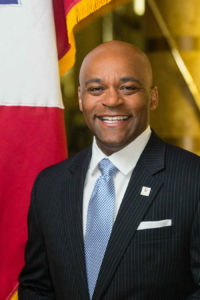
An Interview with Catherine Strode
In November, voters in the city of Denver will decide the fate of a $937 million general obligation bond package proposed by Mayor Michael B. Hancock. The general obligation bonds are designed to fund capital improvements across the city.
Mayor Hancock is targeting better mobility for people with disabilities as a central goal. In an interview with Catherine Strode, the Mayor acknowledges the success of community listening sessions concerning accessibility needs. He also discusses increased bond amounts for accessibility improvements.
What accessibility challenges for people with disabilities are you aware of in the city of Denver?
“The objective is to identify areas in need of additional improvements to ensure comprehensive equity and access. We have held focus groups to the concerns related to accessibility in some of our venues. We’ve found instances where people are not respectful. RED ROCKS is an area that has caused us a great deal of concern. We learned there were people who were manipulating our front area seats and taking that opportunity away from individuals with disabilities. Arts and Venue is evaluating and reassessing increasing access to our venues where we found major challenges. We are moving forward with that. We have hired three enforcement agents who their only job is to go around and make sure people are not violating the rules of accessible parking. We have raised the parking violations as a result. We have particular concerns for individuals who have mobility aids (for example wheelchairs) navigating our sidewalks. In the next two weeks, during the Denver Days’ observance, we have attention on engaging citizens to be more conscious of snow events in the city. We’ll be reminding our neighbors to clear their sidewalks so that all citizens, including those who may use mobility aids, can transverse our streets and sidewalks. We’ll be pushing that initiative over the next two weeks and hopefully raise the consciousness of all citizens of Denver.”
How much money is committed to improving accessibility for people with disabilities in the city of Denver?
“Since 2015, when I talk about ‘We Are All Denver’, it came to my attention we had too many curbs and sidewalks that were not accessible. We didn’t have curb ramps; or curb ramps were not to standard. Starting in 2015, I committed over 30 million dollars to bring those curb ramps up to standard, as well as to install them where they were not existent. We’re committed to installing a minimum of 1500 curb ramps a year and to continue our comprehensive survey of city street corners to identify the number of curb ramps that are missing and do not comply with current standards. We expect by the end of this year that work will be completed. That will again be a 30 million dollar commitment we made three years ago. More than two million dollars, funded through the bond, were added toward accessibility improvements around our city. These are to improve accessibility to some of our current buildings, our playgrounds, and exceeding the standards of the federal government. I’m excited about that.”
In what other ways is the city of Denver working to meet the needs of people with disabilities in the city?
“Over the course of the next year, the city will continue to conduct a citywide review of policies and procedures. Our Sheriff’s Department is working to address policy changes with regard to inmates with disabilities. The Police Department is looking at revising procedures pertaining to engaging citizens with disabilities. We also recognize that we need to train our city employees and all of our external facing agents of the city. I’m talking about any employee who has community engagement opportunities, including our police, on how to engage customers with disabilities and make sure we are meeting their needs. We are investing in areas like our Human Rights and Community Partnerships Office, our Disability Rights Office, our Office of Sign Language Services. We want to further broaden our community engagement in order to best impact and serve the citizens.”
How does the city of Denver address the diversity of individuals with disabilities, including those with a range of immigration status?
“I’m not sure we can distinguish whether or not someone is an immigrant or not. Our services are for whoever is seeking that service from us and we try our best to provide that service. I strongly believe when we say, ‘We Are All Denver’, we take that very seriously. Underscore ALL. When we think about how we can serve individuals with disabilities we try to address some of the concerns about opportunities with regards to this demographic in our community. First and foremost, we recognize there is a ready, available, and capable pool of individuals with disabilities in our community. In October, our Commission For People With Disabilities will be hosting a diverse and inclusion symposium. Our goal is to bring employers and individuals in contact to expose and create employment opportunities. We want to make sure we are as inclusive as possible. Our Office of Human Resources has rewritten their mission statement and objectives to make sure it’s not only about diversity but it’s about diversity and inclusion.”
 Catherine Strode is Advocacy Denver’s Communications and Policy Specialist. She holds a Masters degree in Public Administration with an emphasis in Health Care Policy. Catherine publishes Policy Perspective, featuring interviews with state policy makers on issues that affect the work and mission of Advocacy Denver.
Catherine Strode is Advocacy Denver’s Communications and Policy Specialist. She holds a Masters degree in Public Administration with an emphasis in Health Care Policy. Catherine publishes Policy Perspective, featuring interviews with state policy makers on issues that affect the work and mission of Advocacy Denver.
